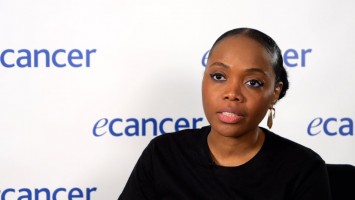Cancer advocacy and fundraising in Nigeria
Dr Zainab Shinkafi-Bagudu - Founder, Medicaid Cancer Foundation
Could you tell us about yourself and the national cancer screening you have been carrying out?
My name is Zainab Shinkafi-Bagudu, I’m primarily a paediatrician and I got into cancer advocacy when I started working with mothers in Nigeria, in Abuja in particular, that had not enough knowledge about their wellness, their health. I got interested in cancer advocacy primarily to educate the population that I was seeing and to increase awareness about their bodies.
From this we moved on to providing screening to help them and when they find something wrong naturally the next thing is, ‘So, what do I do?’ So navigating through the entire cancer spectrum became my full-time occupation and I work in various spaces in the community at the state level and at the national level, helping to advocate for better policies. Through my Medicaid Cancer Foundation we’ve screened over 40,000 women for both breast and cervical cancer in Nigeria and then we provide funding through various fundraising efforts.
I also chair a platform known as the First Ladies Against Cancer Initiative of Nigeria and this is the one that helps us with the policy advocacy. Globally I have been involved in cancer control through my membership of the Union for International Cancer Control and that also gives me a voice to be able to ensure that our national policies are adhered to. Like most low- and middle-income countries, we have a national cancer control plan in Nigeria but not all the points have been adequately met. As advocates we strive to ensure that we meet those points, those targets, and make sure that the patients are the ultimate beneficiaries.
Globalcan recently published cancer data and emphasised that cancer incidence and mortality will be on the rise by 2050. What is your opinion on how to mitigate this burden in LMICs?
The gap in cancer control is very wide between the global north and south. The barriers that are responsible for this are many, some of them are pretty obvious. Awareness is poor, education, resources in terms of human resources and financial resources are poor. Data is weak and also the amount of research that is going on in the global south is not adequate to meet the numbers that exist.
At the bottom of all this you will say that investment, more financial investment, is required and for us to be able to get to the point that will make a difference a lot of advocacy is needed for the financial investment that is required. That is part of the work that I am very happy to do. We work with various partners building partnerships and having patient-led voices to ensure that a lot of the issues are mitigated. We work very closely as a group of civil society to bring the human papilloma virus to Nigeria and we’re glad to say that now it’s had two rounds of the rollout. In the first round we were able to vaccinate five million girls with assistance from partners like the World Health Organisation, GAVI and, of course, the Federal Ministry of Health but the initial advocacy was really civil society led. Now we’re aiming, the target for that is 15 million girls; without the investment, without the financial backing, there’s no way we would have been able to afford those vaccines for the millions of girls in Nigeria that need them.
Could you tell us about Nigerian Cancer Health Fund?
One of the innovative ways that we’ve been able to work on the issue of funding in Nigeria is through the Cancer Health Fund. The Cancer Health Fund is a government funded government pot of funding that cancer patients are able to access. However, it needs more investment, more diagnostics involved in it and more awareness, more education. Communication about the fund is not as adequate as we would like it to be and so cancer patients do not always know about it. But it exists and initial investment of ₦1 billion has grown and patients are now getting their funding through that access programme.
There are also other access programmes like the chemotherapy access programme which we started in the Medicaid Cancer Foundation and then scaled up at a state level. Eventually the federal government is also offering it too. It covers three cancers: breast, prostate and cervical. Breast, of course, is the commonest cancer in Nigeria, unsurprisingly, followed by prostate and then cervical. But the mortality rates are often in the region of 70% so without this investment, without support for the patients, it’s very difficult to have survivorship rates increase.








